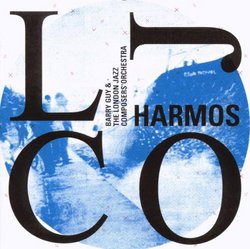| All Artists: Barry Guy, London Jazz Composers' Orchestra, LJCO Title: Harmos Members Wishing: 0 Total Copies: 0 Label: Intakt Release Date: 1/29/1994 Genre: Jazz Style: Avant Garde & Free Jazz Number of Discs: 1 SwapaCD Credits: 1 UPC: 7619942501327 |
Search - Barry Guy, London Jazz Composers' Orchestra, LJCO :: Harmos
CD Details |
CD ReviewsA merging of musical styles N. Dorward | Toronto, ON Canada | 10/02/2001 (5 out of 5 stars) "Barry Guy's London Jazz Composers' Orchestra (LJCO--not to be confused with the LCJO--Lincoln Center Jazz Orchestra!) has been around for thirty years now. It was originally formed to play his composition _Ode_ (recorded in 1972, & rereleased as a 2CD set on Intakt in 1996); although it's on occasion performed other composers' work, its repertoire is mostly specifically written for it by Guy. The musicians in the 17-piece ensemble are a cross-section of Guy's generation of British free-improvisors: the lineup on this recording is: Henry Lowther, Jon Corbett: trumpet; Marc Charig: cornet; Paul Rutherford, Radu Malfatti, Alan Tomlinson: trombone; Steve Wick: tuba; Trevor Watts, Evan Parker, Simon Picard, Pete McPhail, Paul Dunmall: saxophones; Phil Wachsmann: violin; Howard Riley: piano; Barre Phillips, Barry Guy: bass; Paul Lytton: drums.Perhaps the word "jazz" in the LJCO's name is unexpected: at the time of the Orchestra's foundation British free-improvisors were at great pains to distinguish their work from "free jazz". Much of the LJCO's earlier work does in fact sound very distant from jazz or free jazz, instead mingling the austerities of contemporary composition & of free improvisation. This appearance is somewhat deceptive (the original Incus release of _Ode_ dropped the last section of the piece, which was big-band jazz reminiscent of Stan Kenton): but certainly _Harmos_, recorded in 1989, marks a strong turn toward the incorporation of jazz elements into Guy's writing for the Orchestra. That said, as Guy's rather Xenakis-like titles indicate ("Harmos", "Polyhymnia", "Theoria"), contemporary composition is still an important reference-point.So does it work? When I first heard this disc I thought it pretty revelatory: it is, quite simply, a terrifically impressive piece of work. I've since grown somewhat more skeptical about the LJCO's endeavours but I think this disc still stands up. It is structured, like all of Guy's work of this vintage, around the individual players of the ensemble, all of whom receive at least some solo space. Its episodes are linked together in a roughly tripartite structure: it begins and ends with the most conventionally jazz-based structures, notably a stately chorale theme, repeated each time more forcefully, & eventually in tandem with improvisation by the keening alto of Trevor Watts. In the middle comes a series of small-group improvisations that are supplemented or partitioned by clangorous interventions from the full orchestra (rather in the manner of Ornette Coleman's _Free Jazz_). These improvisations are abruptly brought to a halt by a straightforward jazz performance by Howard Riley; this is rounded off by a showstopping feature for Evan Parker which eventually circles back to the original chorale theme, with Watts again featured at the conclusion.It's an impressive performance & an impressive composition. There are a few moments that don't strike me as quite perfectly worked-through (the strutting march that ends the initial statement of the chorale is a tad pompous, & the switch to Riley's jazz section strikes me as facile jumpcutting), & there's an occasional fondness for loud, harsh brassiness which is no less irritating here than in more conventional bands like those of Kenton or Ferguson. But these hesitations are as nothing compared to the grandeur of other moments--notably the chorale itself. Like other sections of this composition (& of other Guy compositions) it employs a highly effective personal device: the repeated extension of a long melody line (so that each time it appears a few more phrases are added).It's hard to think of too many discs one might recommend to both fans of _Ascension_ & of contemporary composition: this is one. It also would serve very well as an introduction to the British free-improv scene. Those who enjoy this disc should move on to the later two-disc recording _Portraits_, also available on Intakt."
|

